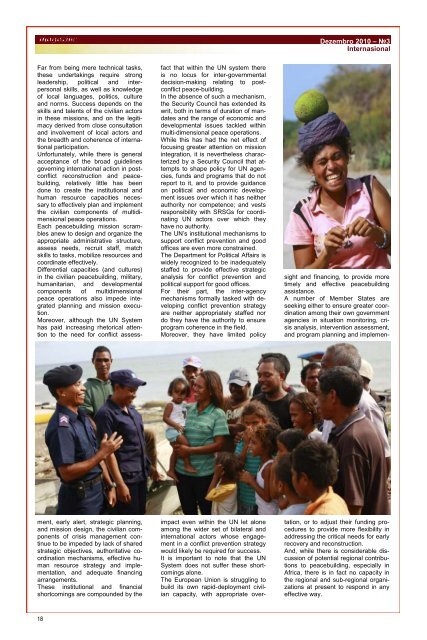IDENTIDADE TIMORENSE
IDENTIDADE TIMORENSE
IDENTIDADE TIMORENSE
Create successful ePaper yourself
Turn your PDF publications into a flip-book with our unique Google optimized e-Paper software.
Far from being mere technical tasks,<br />
these undertakings require strong<br />
leadership, political and interpersonal<br />
skills, as well as knowledge<br />
of local languages, politics, culture<br />
and norms. Success depends on the<br />
skills and talents of the civilian actors<br />
in these missions, and on the legitimacy<br />
derived from close consultation<br />
and involvement of local actors and<br />
the breadth and coherence of international<br />
participation.<br />
Unfortunately, while there is general<br />
acceptance of the broad guidelines<br />
governing international action in postconflict<br />
reconstruction and peacebuilding,<br />
relatively little has been<br />
done to create the institutional and<br />
human resource capacities necessary<br />
to effectively plan and implement<br />
the civilian components of multidimensional<br />
peace operations.<br />
Each peacebuilding mission scrambles<br />
anew to design and organize the<br />
appropriate administrative structure,<br />
assess needs, recruit staff, match<br />
skills to tasks, mobilize resources and<br />
coordinate effectively.<br />
Differential capacities (and cultures)<br />
in the civilian peacebuilding, military,<br />
humanitarian, and developmental<br />
components of multidimensional<br />
peace operations also impede integrated<br />
planning and mission execution.<br />
Moreover, although the UN System<br />
has paid increasing rhetorical attention<br />
to the need for conflict assess-<br />
ment, early alert, strategic planning,<br />
and mission design, the civilian components<br />
of crisis management continue<br />
to be impeded by lack of shared<br />
strategic objectives, authoritative coordination<br />
mechanisms, effective human<br />
resource strategy and implementation,<br />
and adequate financing<br />
arrangements.<br />
These institutional and financial<br />
shortcomings are compounded by the<br />
18<br />
fact that within the UN system there<br />
is no locus for inter-governmental<br />
decision-making relating to postconflict<br />
peace-building.<br />
In the absence of such a mechanism,<br />
the Security Council has extended its<br />
writ, both in terms of duration of mandates<br />
and the range of economic and<br />
developmental issues tackled within<br />
multi-dimensional peace operations.<br />
While this has had the net effect of<br />
focusing greater attention on mission<br />
integration, it is nevertheless characterized<br />
by a Security Council that attempts<br />
to shape policy for UN agencies,<br />
funds and programs that do not<br />
report to it, and to provide guidance<br />
on political and economic development<br />
issues over which it has neither<br />
authority nor competence; and vests<br />
responsibility with SRSGs for coordinating<br />
UN actors over which they<br />
have no authority.<br />
The UN’s institutional mechanisms to<br />
support conflict prevention and good<br />
offices are even more constrained.<br />
The Department for Political Affairs is<br />
widely recognized to be inadequately<br />
staffed to provide effective strategic<br />
analysis for conflict prevention and<br />
political support for good offices.<br />
For their part, the inter-agency<br />
mechanisms formally tasked with developing<br />
conflict prevention strategy<br />
are neither appropriately staffed nor<br />
do they have the authority to ensure<br />
program coherence in the field.<br />
Moreover, they have limited policy<br />
impact even within the UN let alone<br />
among the wider set of bilateral and<br />
international actors whose engagement<br />
in a conflict prevention strategy<br />
would likely be required for success.<br />
It is important to note that the UN<br />
System does not suffer these shortcomings<br />
alone.<br />
The European Union is struggling to<br />
build its own rapid-deployment civilian<br />
capacity, with appropriate over-<br />
Dezembro 2010 – №3<br />
Internasional<br />
sight and financing, to provide more<br />
timely and effective peacebuilding<br />
assistance.<br />
A number of Member States are<br />
seeking either to ensure greater coordination<br />
among their own government<br />
agencies in situation monitoring, crisis<br />
analysis, intervention assessment,<br />
and program planning and implemen-<br />
tation, or to adjust their funding procedures<br />
to provide more flexibility in<br />
addressing the critical needs for early<br />
recovery and reconstruction.<br />
And, while there is considerable discussion<br />
of potential regional contributions<br />
to peacebuilding, especially in<br />
Africa, there is in fact no capacity in<br />
the regional and sub-regional organizations<br />
at present to respond in any<br />
effective way.


